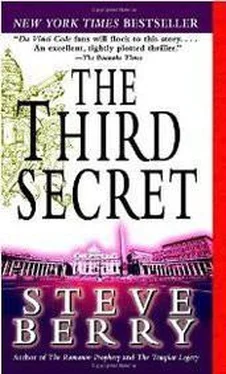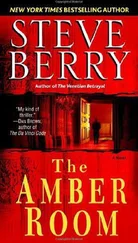He moved closer.
Her gaze seemed locked on something beyond the walls. She was unaware of his presence and continued to mumble. For an instant he thought he caught a glimmer of light in her pupils—two quick flashes of a reflected image—a swirl of blue and gold. His head whirled left, searching for the source, but there was nothing. Only the sunlit corner and the silent statue. Whatever was occurring was apparently Jasna’s alone.
Finally her head dropped and she said, “The Lady’s gone.”
She stood and moved toward a table and scribbled on a pad. When she finished, she handed the sheet to Michener.
My children, great is the love of God. Do not close your eyes, do not close your ears. Great is His love. Accept my call and my plea that I am entrusting to you. Consecrate your heart and make a home for the Lord within it. May He dwell within it forever. My eyes and my heart will be here even when I will not be appearing anymore. Conduct yourselves in everything as I’m asking you and leading you to the Lord. Do not reject God’s name from yourselves, so that you would not be rejected. Accept my messages so that you would be accepted. It is time for decisions, my children. Be of righteous and innocent heart that I could lead you to your Father. Because this, my being here, is His great love.
“That’s what the Virgin told me,” Jasna said.
He read the message again. “Is this directed to me?”
“Only you can decide that.”
He handed the page to Katerina. “You still haven’t answered my question. Who can tell us the tenth secret?”
“No one can.”
“The other five seers know the information. One of them can tell us.”
“Not unless the Virgin consents, and I’m the only one left who experiences Her visits daily. The others would have to wait to receive permission.”
“But you don’t know the secret,” Katerina said. “So it doesn’t matter you’re the only one who’s not privy. We don’t need the Virgin, we need the tenth secret.”
“One goes with the other,” Jasna said.
He couldn’t decide if he was dealing with a religious fanatic or someone truly blessed by heaven. Her impertinent attitude didn’t help. In fact, it only made him suspicious. He decided they would stay in town and try, on their own, to speak with the other seers who lived nearby. If nothing was learned, he could return to Italy and track down the one who lived there.
He thanked Jasna and started for the door, Katerina in tow.
Their host stayed rooted in the chair, her expression as blank as when they arrived. “Don’t forget Bamberg,” Jasna said.
Chilly fingers danced along his spine. He stopped and turned back. Had he heard right? “Why did you say that?”
“I was told to.”
“What do you know about Bamberg?”
“Nothing. I don’t even know what it is.”
“Then why say it?”
“I don’t question. I only do as I am told. Perhaps that’s why the Virgin speaks to me. There is something to be said for a loyal servant.”
FORTY-ONE
VATICAN CITY, 5:00 P.M.
Valendrea was growing impatient. His concern about the straight-backed chairs was proving justified, as he’d now spent nearly two agonizing hours sitting upright in the sedate Sistine Chapel. During that time each of the cardinals had walked to the altar and sworn before Ngovi and God that they would not support any interference in the election by secular authorities and, if elected, would be munus Petrinum —pastor of the universal church—and defend the spiritual and temporal rights of the Holy See. He, too, had stood before Ngovi, the African’s eyes intense while the words were said and repeated.
Another half hour was needed to administer an oath of secrecy to the attendants allowed to remain within the conclave. Then Ngovi ordered everyone but the cardinals from the Sistine and the remaining doors closed. He faced the assembly and said, “Do you wish a vote at this time?”
John Paul II’s Apostolic Constitution allowed for a first vote immediately, if the conclave so desired. One of the French cardinals stood and stated that he would. Valendrea was pleased. The Frenchman was one of his.
“If there be any opposition, speak now,” Ngovi said.
The chapel stayed in repose. There was a time when, at this moment, election by acclamation could occur, supposedly the result of a direct intervention by the Holy Spirit. A name would be spontaneously proclaimed and all would agree he was to be pope. But John Paul II eliminated that as a means of election.
“Very well,” Ngovi said, “we will begin.”
The junior cardinal-deacon, a fat, swarthy man from Brazil, waddled forward and chose three names from a silver chalice. Those selected would act as scrutineers, their task to count each ballot and record the votes. If no pope was elected, they would burn the ballots in the stove. Three more names, the revisers, were pulled from the chalice. Their job would be to oversee the scrutineers. Finally, three infirmarii were selected to collect ballots from any cardinals who might be taken ill. Of the nine officials, only four could be regarded as solidly Valendrea’s. Particularly upsetting was the selection of the cardinal-archivist as a scrutineer. The old bastard might have his revenge after all.
Before each cardinal, beside the pad and pencil, lay a two-inch rectangular card. At the top was printed in black lettering: ELIGO IN SUMMUM PONTIFICEM. I elect as supreme pontiff. The space beneath was blank, ready for a name. Valendrea felt a special attachment to the ballot, as it had been designed by his beloved Paul VI.
At the altar, beneath the agony of Michelangelo’s Last Judgment, Ngovi emptied the silver chalice of the remaining names. They would be burned with the results of the first balloting. The African then addressed the cardinals, speaking in Latin, reiterating the voting procedures. When he finished, Ngovi left the altar and took a seat among the cardinals. His task as camerlengo was drawing to a close, and less and less would be demanded of him in the hours ahead. The process now would be controlled by the scrutineers until another ballot was required.
One of the scrutineers, a cardinal from Argentina, said, “Please print a name on the card. More than one name will void the ballot and the scrutiny. Once done, fold the ballot and approach the altar.”
Valendrea glanced to his left and right. The 113 cardinals were wedged into the chapel elbow-to-elbow. He wanted to win early and be done with the agony, but he knew that rarely had any pope won on a first scrutiny. Usually electors cast their initial ballot for someone special—a favorite cardinal, a close friend, a person from their particular part of the world, even themselves, though none would ever admit that. It was a way for the electors to conceal their true intentions and up the ante for their subsequent support, since nothing made the favorites more generous than an unpredictable future.
Valendrea printed his own name on the ballot, careful to disguise anything that might identify the script as his, then folded the paper twice and awaited his turn to approach the altar.
Depositing ballots was done by seniority. Cardinal-bishops before cardinal-priests, with cardinal-deacons last, each group ranked by date of investiture. He watched as the first senior cardinal-bishop, a silver-haired Italian from Venice, climbed four marble steps to the altar, his folded ballot held high for all to see.
At his turn Valendrea walked to the altar. He knew the other cardinals would be watching so he knelt for a moment of prayer, but said nothing to God. Instead, he waited an appropriate amount of time before rising. He then repeated out loud what every other cardinal was required to say.
Читать дальше












